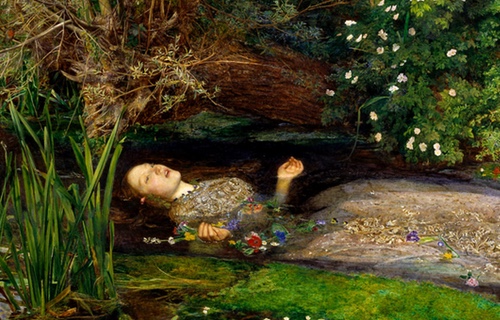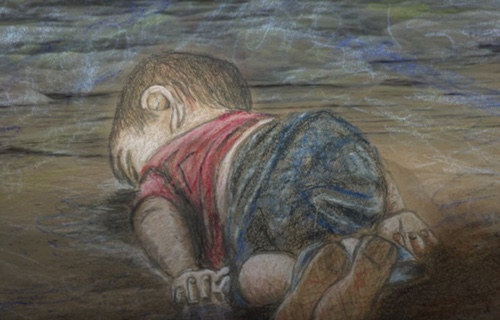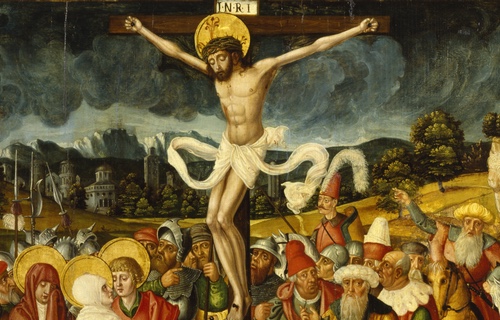Last week I went with my friend Steve Knight to see Hamlet at the Barbican. Hamlet is a tragedy. By the end of the play everyone of any dramatic importance is dead. The old king has had a “leperous distilment” poured in his ear. Polonius is stabbed in error behind the arras. Rosencrantz and Guidenstern are sent to their doom in England by Hamlet’s cunning. In the last scene, Claudius, Gertrude, Laertes and Hamlet manage to poison each other within the space of a few minutes in a manner that teeters on absurdity. Only Ophelia’s death has any pathos to it. The poor demented girl slips into a river off-stage and drowns. Millais’ sumptuous depiction is well known.

Another image of a drowning has been impressed on our minds this week, the pathos in this case almost unbearable, its symbolic power immense. The story of Aylan Kurdi’s short life came to a tragic end in the stretch of sea between Turkey and the Greek island of Kos. His body was found washed up on a tourist beach.

His story was inseparable from that of his Syrian Kurdish family, from the devastated town of Kobani, who, along with thousands of others, were trying to get to Europe. The reason for their flight was the civil war in Syria, which was originally part of the Arab Spring narrative—popular uprising against tyranny—but has now been assimilated into a much more savage storyline about the emergence and consolidation of a strict Islamic state, as the basis for a worldwide caliphate, in Syria and Iraq.
These developments are at least partly explained by the sorry tale of Western intervention in the Middle East over the last century, culminating in the invasion of Iraq in 2003. My Iraqi hairdresser this morning firmly blamed the Americans and British for the chaos in his country.
But last year the leader of Islamic State, Abu Bakr al-Baghdadi, invoked an aspiration that goes back at least to Sultan Mehmet and the capture of Constantinople. Urging Muslims from across the world to rush to their new state, he declared: “This is my advice to you. If you hold to it you will conquer Rome and own the world, if Allah wills.”
The small Syrian town of Dabiq has come to prominence recently because according to a saying of the Prophet Mohammed recorded in the Hadith, the “last hour” will not come until Muslims defeat the Romans here on their way to conquering Constantinople.
When Hungary’s prime minister, Viktor Orban, expressed his concerns about the impact of such a large influx of Muslims on Christian Europe, he was likewise—belatedly—drawing on a centuries old narrative about the clash between East and West.
We could go on. Much of our experience of the world now is mediated through snapshots and video clips. But even the most powerful images are carried by an endless sea of stories until they wash up on the shores of our imaginations.
The crucifixion of Jesus is another iconic moment, paused and captured and imprinted on our minds by old theologians and medieval religious artists and modern evangelists and hymn-writers. But, as we are beginning to appreciate, Jesus’ death was not an isolated metaphysical event. Like the deaths of Ophelia and Aylan Kurdi, it was part of a long story about peoples and kingdoms, about war and deliverance, about the ebb and flow of civilisations and cultures.

The story begins with Abraham and runs all the way through to our own times and the beleaguered state of the modern church in the West. It didn’t stop with the resurrection of Jesus, no matter how climactic that event was for the story of ancient Israel. It didn’t stop with the destruction of Jerusalem and the temple. Or the conversion of the empire. It drove on through schism and crusades and reformation and imperial expansion and intellectual crisis and the triumph of secularism, and it will drive past us into an uncertain future.
My view is that a narrative theology must do more than tell the biblical story. That’s good, but it leaves us still unable to engage meaningfully with our own historical circumstances. I argue for a largely historical reading of New Testament eschatology on grounds of language and context, but the approach has the further advantage of connecting the narrative of scripture with the history of the church. It binds together the end of second temple Judaism and the beginning of Christendom. But a lot more storytelling needs to be done before we have adequately accounted for our own coming and going in the bewildering drama of the modern world.
The question, in my mind, is how? The obstacle, again to my mind, is how to escape an abstract propositional perspective. What I have seen of American evangelicalism is the adoption of narrative and story not as a way to better understand scripture, and thus who we are as the people of God and how we got here and where we are headed, but as a way to illustrate doctrinal and missional concepts and propositions. These narratives are driven not by the story as best we can understand and engage with it, but by presupposed beliefs which are then highlighted, and unpacked, and understood with the aid of narrative, context, etc.
For many, Christianity is a set of propositions to be accpepted and embraced. For “fundamentalists” these propositions are laid out in incredible detail in doctrinal statements and professions of faith required to be considered orthodox. The Gospel here is reduced to Christ died for me, a sinner, so I could go to heaven. In gratitude I live for him and seek to rescue as many non-believers as I can. But for a wide swath of others, the driver of what it means to be a Christian is still focused on doctrines and concepts even if those are missional or social justice based.
As someone who has taught your books and approach in Sunday school and small groups (and who is leading a small group that wrestles in part with these issues) in a mainline church, I really struggle with how this approach can impact and grow within the church.
Recent comments